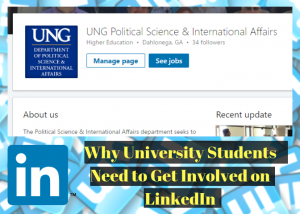College Students and LinkedIn
 A common misconception that students might have regarding LinkedIn regards the purpose of a LinkedIn account. It is not just a tool used to build a resume. While it can help elaborate on prior work experiences, LinkedIn additionally allows users to give employers perspective into their personalities and interests. Linked In allows for communication between old and new coworkers, professors, and peers.
A common misconception that students might have regarding LinkedIn regards the purpose of a LinkedIn account. It is not just a tool used to build a resume. While it can help elaborate on prior work experiences, LinkedIn additionally allows users to give employers perspective into their personalities and interests. Linked In allows for communication between old and new coworkers, professors, and peers.
As a student it is important to strategize for success. University life does not last for forever, even for those fifth or sixth year seniors or graduate students pursuing masters degrees. Networking and resume building can be started at any time, and frankly the sooner the better.
Moving into the professional world can be a daunting task, but early preparation can make the transition much easier. Being proactive can set students apart from other employment seekers who do not put themselves in the same operating sphere as hiring institutions.
Using LinkedIn allows students to take stock of what their skills are, and understand what it is employers are looking for. Students can connect with individuals already in the positions that they want to be in after graduation, and ask them how they got there. They can map out other’s career progression, and see the skills that have made them successful. Mimicry is not just the highest form of flattery, but the easiest way to achieve success. Students do not have to reinvent the wheel, they can choose the best car to get them where they want to go!
Building a network of people to emulate makes career mapping easier. Students need to find mentors on LinkedIn, and seek their career and educational advice. Those professionals are well suited for knowing how to set the best conditions for post-University employment. Additionally, getting a small glimpse of life on the other side might bring the conclusion that a different field would be more suitable, which is a discovery better realized prior to graduation.
Once those networks are built, students can stay in contact with previous professors, coworkers, and peers. Through those networks students can build relationships that allow career development. Without making this important and vital connection prior to graduation, students must resort to trying to create these relationships during their job hunt, further complicating the process.
Next in this process of staying connected and building networks is getting connected too YOUR Political Science and International Affairs Department’s LinkedIn page. Connecting to alumni and students in your field of work opens up opportunities, ranging from potential employment to gaining experience and mentorship.
If you would like to get ahead of your peers and build those connections, follow the UNG Political Science & International Affairs LinkedIn page at https://www.linkedin.com/company/ung-political-science-international-affairs/.


